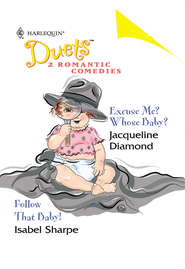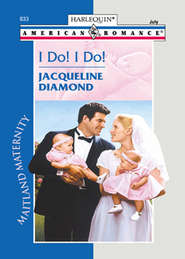По всем вопросам обращайтесь на: info@litportal.ru
(©) 2003-2025.
✖
The Police Chief's Lady
Автор
Год написания книги
2018
Настройки чтения
Размер шрифта
Высота строк
Поля
“Very.” He let it go at that. No point in feeding the gossip mill, which was obviously working overtime.
Gwen shook her head at him. “One of these days, Ethan Forrest, some woman is going to get under your skin. You’ll open that gorgeous mouth of yours and poetry will flow out.”
He raised his water glass in a toast. “I live for that day, chérie.”
She gave an exaggerated sigh. “If I weren’t old enough to be your mother, I’d take a stab at it myself.” Across the counter, she accepted a stack of pastry boxes. “Well, I’m off. I’ll give the ladies your regards.”
“Please do.”
His onion soup arrived, encrusted with melted cheese. Savoring the taste, Ethan let his thoughts wander back to that afternoon.
He wondered what Jenni had meant about her parents not being around much during her younger years. Perhaps they’d shuffled their child off to boarding schools.
Having worked summers and weekends since he was a teenager, Ethan found it hard to sympathize with a poor little rich kid, but he had to admit Jenni had turned out squarely grounded. She must have worked hard in medical school, and he assumed she put in long hours at her profession.
That she’d chosen to relocate to Downhome puzzled him. Even in light of the scandal in L.A., she must have had other options. Perhaps she’d decided to play at being a country doctor.
What had Mom been thinking when she offered to rent to Jenni? The last thing Nick needed was to grow attached to a short-term renter.
More people entered the restaurant, and Ethan forgot about Jenni as acquaintances stopped to say hello. One expressed concern about the portrait thefts. A couple of people asked if he’d heard the talk of a proposed new shopping center on the west side of Downhome. He had, of course. Rumors had swirled for months over the sale of several hundred acres in that area, but so far a proposal had not come before the city council. Ethan knew no more than anyone else.
He was digging into his patty melt when Barry Lowell slid into the chair across from him. “Mind if I join you?” The editor had picked up a Reuben sandwich at the take-out counter.
“Be my guest. Did your sister ban you from the premises tonight?”
“What? No.” He pulled the plastic lid from his soda cup and took a swallow. A few years younger than Ethan, Barry had thick brown hair that perpetually flopped on to his forehead, almost covering the scar he’d received in prison. Although he worked next door to the Snip ’N’ Curl, he rarely found time to pay it a visit. “I just finished putting the paper to bed.”
The Gazette, which came out on Tuesdays, was printed in Mill Valley. Ethan assumed Barry sent his pages over there electronically. “Competing with other media must be hard when you only publish once a week.”
“It’s not hard at all,” Barry said between bites. “You think CNN’s going to cover the disappearance of Pepe Otero’s family photo?”
“I suppose not.” Hearing a touch of bitterness in the editor’s voice, Ethan avoided making further comments about the national media and turned to the need for people to lock their doors until the wave of break-ins was solved.
Barry readily agreed. It was a far cry from the kind of journalism he longed to practice, though, Ethan knew.
By all accounts, Barry had been an ambitious teenager, editing the school paper and working part time for his parents’ Gazette. He’d made no secret of his plans to write for a major newspaper someday.
When he was seventeen, he was accused of killing a farmer during a prank. Based on the testimony of his best friend, Barry had been convicted of manslaughter, despite his claim that he’d only struck a glancing blow in self-defense.
Although Ethan’s family had moved away by then, he’d read the police reports since his return. The case was a tragedy all around, since it seemed obvious Barry hadn’t intended to harm anyone. Still, he must have struck harder than he realized, because the farmer died of his injuries.
In prison, Barry had taken college courses and, following his release, earned a journalism degree from the University of Tennessee. His murder conviction had ended his dreams of making it in the big league, however, and he’d eventually returned to Downhome to take over the Gazette from his parents.
“So you get to relax for the weekend?” Ethan asked, making conversation.
“No. I’ve got an advertising publication to put together.” Barry downed a handful of french fries before continuing. “And I’m working on a story of my own, kind of a long-term thing. That’s what I wanted to talk to you about.”
“I’ll be in my office for a few hours tomorrow,” Ethan said. “If you want to access records, though, you’ll need to wait till Monday, when Amy’s on duty.”
“No, no, I’d just like to show you what I’ve put together. I’d appreciate your opinion,” Barry explained.
“It’s a crime story?” This aroused Ethan’s interest. If the newspaper planned to run an exposé, he wanted advance notice. “I’d be glad to read it.”
Barry swept aside the remains of his meal. “Are you free tonight?”
It occurred to Ethan that his colleagues in Nashville would have found it odd to see a police chief eating dinner with a convicted murderer, and even odder to find him treating the man as a friend. But Barry Lowell had reclaimed his place in society, and besides, Ethan liked him.
“Sure. We can walk over to your office right now.”
“It’s not at the office. It’s at my house,” Barry said. “I was hoping you could stop in on your way home.”
Now, that was a tough one, Ethan thought ironically. He’d just been invited to the very place where Jenni, Karen et al were probably dissecting him and the town’s other single men.
Discretion urged him to schedule a visit some other time. But he’d like to get his outreach program started this summer, and if he had a chance to join the conversation, he might be able to enlist the support of the other ladies.
He supposed the tactic might irritate Jenni. On the other hand, she could hold her own, and Ethan was in the mood for a round of sparring.
“That would be fine,” he replied.
Barry crumpled his paper napkin. “Let’s go.”
THE LOWELLS’ TWO-STORY BRICK HOUSE on Heritage Avenue rang with lively voices and good fellowship. Jenni found it hard to believe she was the center of attention, accepted by the other women as if she belonged here.
She wasn’t accustomed to belonging. They almost seemed to have mistaken her for someone else—although she knew that wasn’t true.
Karen had set out her best patterned china on the cloth-covered dining table, along with a plate of deviled eggs and platters of cold cuts and sliced bread. She’d waved away Jenni’s offer to cook something, as well—a relief to Jenni, since her chief culinary skill was reheating pizza.
Jenni was surprised to discover that Karen’s women friends ranged in age from their thirties all the way up to 80, but in a town this small, she learned, people didn’t segregate along age lines—and the menu proved the big winner. Gwen Martin had brought incredible pastries from her café. Rosie O’Bannon, the forty-something owner of the beauty parlor, produced a multilayered taco dip with sour cream, guacamole and refried beans. She proudly offered it as a California recipe in Jenni’s honor.
Rosie’s niece, Leah, a first-grade teacher, was introduced as Karen’s best pal since childhood. She’d prepared not one but two dishes—a green bean casserole and a Jell-O mold. Leah radiated goodwill, appearing not the least threatened that her closest pal had acquired a new friend.
From the nursing home, Karen had fetched Mae Anne McRay, the liveliest octogenarian Jenni had ever met, who’d prepared a fruit salad. Despite being confined to a wheelchair due to osteoporosis, she served on the city council.
Two people were missing. Renée Lowell, Karen and Barry’s mother, whom Jenni had met previously, had stayed at the convalescent home because of a headache. A quadriplegic since a tractor hit her car years earlier, Renée had inspired Karen to apply her business administration training to running the convalescent center.
In addition, Amy Arroyo, the police chief’s notoriously absentminded secretary, hadn’t shown up by the time the women began taking their places around the table. Karen went into the kitchen to call her and returned a few minutes later.
“She forgot,” she reported.
“No surprise there,” Gwen responded.
“She said she’s taking a bubble bath and reading a book. Naturally, she didn’t remember to fix any food, either.” Karen shook her head indulgently. “I urged her to come anyway, but she declined. I think she was embarrassed.”
“She should be,” Mae Anne observed.
“I hope it’s a good book. Still I doubt it’s worth missing this feast,” Jenni said.
“Amy ought to pay more attention to real life,” the hostess replied. “I hope you aren’t offended.”











